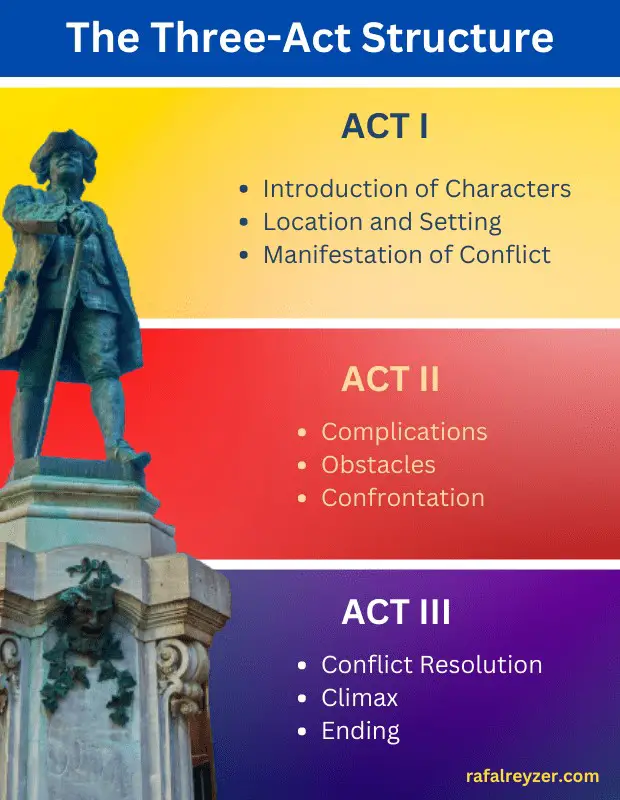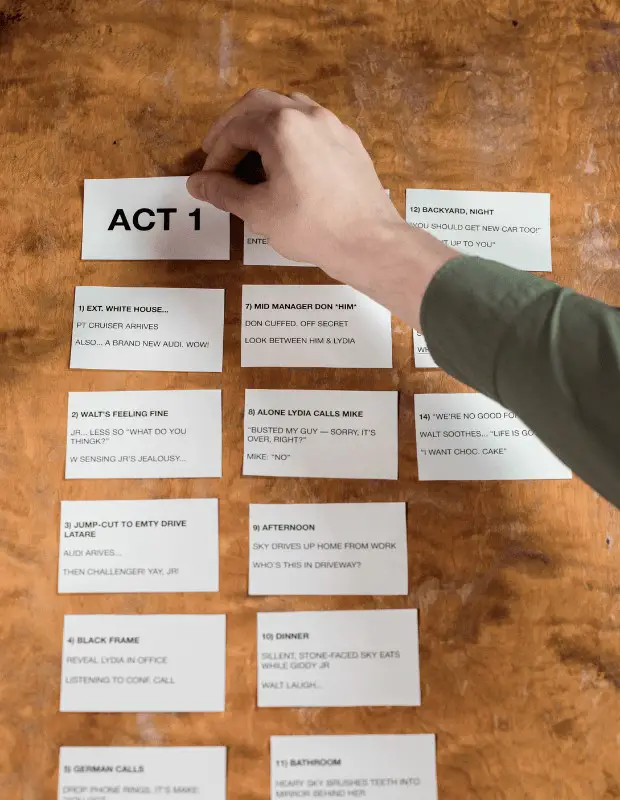
Dream of seeing your words unfold on stage? Dive into the world of playwriting.
However, sculpting successful plays demands not just talent but relentless dedication. But for those with the passion, the thrill of watching your work come alive on stage is unmatched. So, what does the journey to becoming a playwright entail? What are the prerequisites and milestones? And once you dive in, what twists and turns should you anticipate in the playwriting voyage?
How to Become a Playwright: Requirements and Steps
Dreaming of joining the ranks of William Shakespeare, Victor Hugo, Anton Chekov, Tennessee Williams, and many other greats in the history of theatre can be overwhelming as there is so much to learn in the theatre world. Thankfully, the digital age can make it possible. For instance, sites like the Travis Preston CalArts website, where longstanding personalities in the theatre space provide relevant information, make it easy and more convenient to refer to some of the great works done in theatre performances. Although many libraries stock huge books containing captivating playwrights, sometimes, it helps to stick with the modern way of doing things. Reading widely on stalwarts in theatre and arts can open you up to a world of possibilities, as those men cast very long shadows for those who are just starting in the biz. Or perhaps you are more into modern-day playwrights that are currently making big splashes in the entertainment industry? Whomever you want to follow, there are certain requirements and steps to become a playwright.
Besides sheer talent and determination, some of the most basic requirements include:
- Excellent writing skills
- Creativity and imagination
- Being highly observant of the events of everyday life
- Having a passion for theatre
As for the steps, potential playwrights can begin their journey by:
- Watching, enjoying, and studying plays
- Getting a background in theater writing and production
- Polishing their writing skills, especially in creating dialogues
- Writing short plays for school and local community production
- Finally writing a full-length play

Starting to Write Plays
Assuming you have zero experience in writing plays, where do you start? First and foremost, you need an idea. And not just any old idea, it needs to be a great one. But don’t worry if you think your ideas aren’t good enough or “worthy” of being turned into a play. Just get them down on paper (or computer screen), then go from there. Once you have your idea, the next step is turning that concept into an actual story with a beginning, middle, and end. This may seem daunting at first, but remember, all stories follow the same basic structure. So, once you figure out what that is for your particular tale, the rest will fall into place like Tetris blocks.
Plotting Out Your Story: The Three-Act Structure
There seems to be a formula that has worked for many generations of playwrights – the Three-Act structure. It means breaking down your story into three main acts: ACT I – Here, you set up the situation, which will become the foundation of all ensuing scenes. It includes introducing a conflict for your main characters, or the protagonists of the story. ACT II – At this stage, you will introduce happenings that further complicate matters and raise the stakes. This is where the villain(s) or the antagonist(s) of the story appears to be getting his or her way. ACT III – Here, you present a resolution to the conflict and the conclusion of the story (though not always a happy one!). Keep this tried-and-true framework in mind as you move forward with fleshing out your plot points and scenes.

Writing the Script
Now that you have your story straight in your head (or at least on paper), it’s time to write the actual play. If this is your first time, don’t worry about making it perfect. Just get the words down and go with the flow. You can always revise and edit later. When writing, one helpful tip is to focus on dialogue rather than description. Why? Because plays are meant to be seen and heard, not read silently in our heads like a novel or short story. So, as you work on each scene, think hard about what your characters would say to each other in their circumstances. And again, don’t sweat perfection here. Natural-sounding conversations will come more easily once you get into the rhythm of things(Just keep those pesky stage directions minimal for now). Before long, you should have a completed first draft of your play! Congratulations! The hard part is over, or so it seems. Now comes revisionary hell. But trust us, it’ll all be worth it when audiences are laughing hysterically or sobbing uncontrollably during YOUR production someday soon. Key takeaway: Plays follow a 3-act structure and should focus on dialogue to make them more natural and interesting.

What to Expect When Getting in Playwriting
1. It’s an Arduous Process
The process is going to be painstakingly long and arduous. There’s no sugarcoating it, playwrights often spend years working on just one script. So if you’re thinking about becoming a playwright, be prepared for some major commitment.
2. It’s a Rewarding Pursuit
The good news is that the payoff can be incredibly rewarding. Seeing your written words come to life on stage is an experience unlike any other. The fact of knowing you created something people are enjoying is an incredible feeling. Getting the audience’s reactions that you hoped for can be very fulfilling. And as a cherry on top, your play’s success could also spell great monetary gain for you.
3. The Experience Vary with Each Playwright
So what does the actual process of writing a play look like? Well, it depends on the person. Every writer has their way of doing things. But most writers start with coming up with an idea for a story (or multiple stories). Once they have an idea or concept in mind, they’ll start fleshing out characters and plot points until they have a full-fledged outline of their play. From there, the real writing begins. This is where playwrights start to bring their vision to life, crafting dialogue and stage directions that will ultimately become the finished product.
4. Be Open and Prepared for Revisions
Of course, even after a play is “finished” it’s often still subject to changes. Directors and actors may have suggestions to make certain scenes work better or for the dialogue to sound more natural. The audience might react in a way that wasn’t anticipated. So, it’s back to the drawing board for you. After all those hours, days, months, or even years of hard work, a playwright’s job isn’t done until the curtain falls on opening night.

Productivity Tips for Playwrights
Maintaining a high level of productivity can be difficult for many playwrights, or for anyone who lives by the pen. After all, your chances for success depend on how much you write and how it will be received by your audience. Here are a few tips on how to become a productive playwright:
1. Set Realistic Goals and Break Them Down Into Manageable Tasks
Trying to accomplish too much at once will only lead to frustration and burnout. Set realistic goals to limit disappointments and increase your chances of success. It will also be tremendously helpful if you break down your goals into manageable tasks. For example, instead of setting your sights on the completion of your script all at once, set goals for writing one chapter at a time.
2. Make Use of Technology
It was figured out that technology escalates productivity, as well as helps conserve time and effort. It affects the workload and ensures control over mistakes. Quick access to information and the aid of writing and editing apps enable writers to come up with quality scripts faster and easier. There are also several story development software out there that any modern-day playwright or novelist would find useful.
3. Establish a Writing Routine
Whether you prefer to write in the morning, afternoon, or even late at night, establish a set time each day (or week) when you will sit down and get some words on paper. Famous author Stephen King said, “I have a routine because I think that writing is self-hypnosis and you fall into a kind of trance if you do the same passes over and over.” This shows how much of a necessity it is to develop a routine to guide you.
4. Surround Yourself With Other Writers
Being around like-minded people can help keep you motivated and inspired. Your peers can also provide you with helpful feedback and advice. It would also be great if you also hang out with those involved in theater productions. It would give you further insights into what the audience appreciates, what lines would have a powerful impact, and know other things that could help improve your craft.
5. Don’t Forget to Take Breaks
It’s important to stay refreshed and focused, so taking some time away from your work now and then is crucial. Go for a walk, watch TV, or just step outside for some fresh air. Anything that would help clear your head before getting back to work. So there you have it, five tips for being a productive playwright. Just remember that everyone is different, so find what works best for YOU and stick with it! Key takeaway: Setting realistic goals, using technology, and taking breaks as needed are keys to becoming a productive playwright.

FAQs on How to Become a Playwright
1. How much does a playwright make?
There is no definitive answer to this question, as playwrights can earn a wide range of incomes depending on the success of their plays and where they are produced. However, many playwrights make a living through royalties from productions of their work and other writing jobs, such as teaching or journalism. Some may also receive grants or fellowships, which help subsidize their personal and professional living expenses.
2. What education do I need to become a playwright?
The educational requirements for becoming a playwright can vary depending on factors, such as your chosen field of specialization and the specific nature of the projects you hope to work on. However, most successful playwrights have at least some formal training in writing or drama, whether through completing a degree program or taking part in workshops and other learning opportunities. Many playwrights find it helpful to gain experience working with theater companies or other organizations that produce live performances; doing so can give you valuable insights into how plays are written and produced.
3. How do I start a career as a playwright?
It’s important to read as many plays as possible. This will give you an understanding of different styles and structures, and also inspire your own work. Attending theatre productions, both professional and amateur, can be extremely helpful in sparking ideas and honing your craft. Finally, joining a drama group or taking part in writing workshops can also be beneficial in terms of feedback and networking opportunities.
4. Do playwrights get paid?
Playwrights’ incomes differ depending on several factors, such as the popularity of their plays, where they live, and whether they also teach. However, many playwrights receive some form of payment for their work, either through royalties from productions or advances from publishers.
Conclusion
If you’re serious about becoming a playwright, these tips, tricks, and resources should help get you on the right path. But if you have the guts to proceed into this unknown territory, then there’s nothing stopping you from seeing your name in the limelight. If you want to learn how to become a playwright, you should start writing as soon as you can instead of just thinking about it. You can find out what the job entails, how to start writing plays, and even examples of famous playwrights, both the legendary and currently rising ones. Being a productive playwright requires dedication and hard work, but it can be an extremely rewarding experience, so try it today. Next up, you may want to explore a guide on using the right word choice in writing.
Hey there, welcome to my blog! I'm a full-time entrepreneur building two companies, a digital marketer, and a content creator with 10+ years of experience. I started RafalReyzer.com to provide you with great tools and strategies you can use to become a proficient digital marketer and achieve freedom through online creativity. My site is a one-stop shop for digital marketers, and content enthusiasts who want to be independent, earn more money, and create beautiful things. Explore my journey here, and don't forget to get in touch if you need help with digital marketing.

